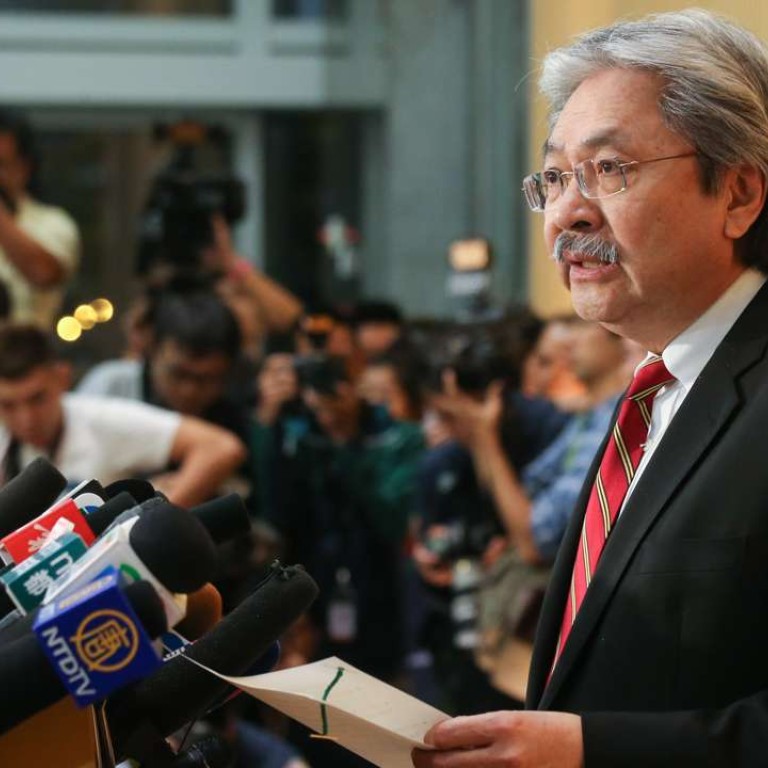
Three major policy initiatives to watch if John Tsang becomes the next chief executive
John Tsang’s legacy as financial secretary offers clues to his potential policy agenda as chief executive
What if John Tsang Chun-wah becomes chief executive of the city?
It may mean the Securities and Futures Commission will purchase its own office premises, more supportive policies on new start-ups and a revamp of Islamic finance, as these are ideas proposed by Tsang during his tenure as Financial Secretary.
Tsang resigned as financial secretary in December, opening the door his candidacy in the city’s 5th term of Chief Executive in elections scheduled for March 26. While Beijing is yet to approve his resignation, brokers and fund managers have already started to speculate on the implications of a Tsang victory.
So far, three other potential candidates have emerged, including Chief Secretary Carrie Lam Cheng Yuet-ngor, Executive Councillor Regina Ip Lau Suk-yee, and retired judge Woo Kwok-hing.
But Tsang is the focus of discussion in the financial sector in Hong Kong, as his track record of financial policy making provides a blueprint of what he might try to accomplish as chief executive.
Tsang is known to support the idea of the SFC buying its own office. Although the SFC suffered a loss of HK$50.6 million in the September-ended quarter, the regulator still had a surplus of HK$7.098 billion.

In its results announcement in December, the SFC said it has earmarked HK$3 billion of the surplus to purchase office space.
An insider told the South China Morning Post that Tsang has always supported the SFC’s bid to buy its own office space as a way to save on rent. The SFC has an office in Cheung Kong Centre which costs HK$52.41 million for the three months to the end of September, or about HK$208 million annually.
The Hong Kong Monetary Authority spent HK$3.7 billion to buy 14 floors of Two IFC, which has saved HK$734.4 million in annual rent per year since the 2001 acquisition.
Tsang is also believed to be in favour of more government support for start-ups.
In his 2015 budget speech, Tsang sought to encourage more start-ups by information technology and other innovative companies. Many brokers believe he would support the Hong Kong Exchanges & Clearing in setting up a third board or other mechanism with less stringent listing rules to help enable young companies to raise funds.
The fashion industry may be another sector favoured by Tsang. In his 2016 budget speech, he promised to spend HK$500 million to support design talent, with a large chunk of that earmarked for promoting local fashion designers and emerging clothing brands at home and overseas.
If Tsang is successful in his yet-to-be declared interest in the top job, he may also revisit the idea of Islamic finance. Tsang has been promoting Islamic finance since 2007. But so far the concept has failed to gain momentum, with the Hong Kong government having emerged as the sole major issuer after releasing two sukuk bonds.
The sukuk issue’s structure and investment guidelines were set according to Islamic requirements.
The relatively small Islamic community in Hong Kong and a limited understanding of the products had contributed to the lack of interest from the corporate banking sector, stockbrokers said.
But of course, Tsang may lose the race. And what will happen if one of the other three potential candidates win?
Regina Ip, as a lawmaker in 2012, commented about the poor performance of the Exchange Fund, which is managed by the HKMA.
The ascendency of Ip is unlikely to be seen as good news by HKMA chief executive Norman Chan Tak-lam and his staff, as they may face heightened scrutiny about the investment performance of the Exchange Fund.
And how about Chief Secretary Carrie Lam? Will she resign and enter the race to become Chief Executive?
Pension fund managers believe she may have an impact on the Mandatory Provident Fund. Speaking at an international pension forum in November, Lam told hundreds of fund managers of her intention to reform the MPF in an effort to boost its popularity. Since its launch in 2000, the scheme has faced criticism over excessive fees and low returns.
Lam may also relaunch a campaign to remove illegal structures on buildings.
Meanwhile, retired judge Woo Kwok-hing, another likely candidate for Chief Executive, may be viewed as providing a boost to Hong Kong’s reputation for rule of law, which would be construed as a positive by global financial markets.

